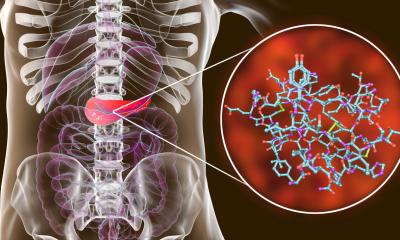Education for the best disease management
At the opening of the Johnson & Johnson Diabetes Institute in Paris experts took the opportunity to warn against the growing incidence of diabetes. They reinforced the believe that improved education measures as a key enabler for patients to better manage the condition. They predicted that in 2025 the number of people with diabetes wil have increased by 20 percent in Europe.

The numbers are quite shocking: 20 per cent within Europe, 80 percent within Eastern Mediterranean and Middle Eastern populations and 80 percent within the African patient population(1) - the number of people living with diabetes will increase amazingly within the next 20 years.
New research unveiled today at the opening of the Johnson & Johnson Diabetes Institute in Paris, a new state-of-the art diabetes training facility for healthcare professionals involved in diabetes care across Europe, the Middle East and Africa (EMEA), that improved education for healthcare professionals and patients could, however, reduce both the financial and personal impact of diabetes on our society.
"With global health expenditure for diabetes and its complications set to exceed US$302.5 billion by 2025, a 30 per cent increase, and some of the largest segments of that expected in Europe, the Middle East and Africa, we interviewed patients and healthcare professionals in six countries representative of this vast region, to see what practical solutions were needed", said former Acting U.S. Surgeon General, Kenneth Moritsugu M.D., M.P.H., FACPM, who serves as the Global Johnson & Johnson Diabetes Institutes' Chairman.
"92% of healthcare professionals surveyed believe patient education can help reduce the burden of diabetes on society, yet despite this, 58% of those patients surveyed want more information and advice from their healthcare professional on how to better manage the disease. This discrepancy can be explained by the fact that healthcare professionals themselves are seeking new and improved training and tools to help in engaging and empowering patients to master their diabetes."
For these reasons, a key aim of the newly opened Johnson & Johnson Diabetes Institute will be to raise the level of care for people with diabetes in the EMEA, through improved education for healthcare professionals, achieved in partnership and collaboration with leading professional societies and experts in the field.
The Johnson & Johnson Diabetes Institute's commitment to improved education as a priority within the EMEA was validated by findings from a research report developed by the Johnson and Johnson Diabetes Institute EMEA and the London School of Economics. The report, Diabetes: Tipping Point or Turning Point?, includes results from detailed interviews with healthcare professionals and patients across the region and extensive analysis of current research, representing a unique attempt to highlight the known escalation of the burden of diabetes across the EMEA and the unmet need for improved educational opportunities for physicians and patients.
"Research shows that in developed nations, health expenditure for diabetes care is higher than it need be because not enough is being spent aiming at the prevention of major diabetes-related complications such as heart disease, stroke, kidney disease and amputations," said Dr. Maria Raikou, a health economist at The London School of Economics and report co-author.
Other highlights from the report include:
- 92 percent of physicians surveyed believe patient education can help reduce the burden of disease on society(2).
- 73 percent of healthcare professionals surveyed would like an increase in the number and quality of tools available to educate patients(3).
- 82 percent of healthcare professionals surveyed believe education is central to the successful management of diabetes(4).
- As many as 60 percent of patients surveyed in the European Union (EU) and 87 percent in non-EU countries have not been given an opportunity to participate in educational initiatives about their disease(5).
The report findings also highlight a perceived failure of policymakers within the EMEA to provide adequate funding for educational measures. Most healthcare professionals surveyed felt that current healthcare policies being implemented for diabetes by national governments are not placing sufficient emphasis on patient education (64 percent)(6).
"The Institute will be more than just a space for healthcare professional training", said Kenneth Moritsugu, M.D. "It is the starting point of a lasting relationship with the diabetes community, a focal point for collaboration amongst healthcare professionals, policymakers, patients and their families. We hope to help improve the understanding of diabetes and subsequently, to improve patient outcomes for one of the biggest public health threats of this century."
For more information, please visit http://www.jjdi.eu
About the Johnson & Johnson Diabetes Institute
Globally, the Johnson & Johnson Diabetes Institute provides healthcare professionals with education, training and a space for collaboration, with the aim of enhancing the understanding of diabetes and helping to improve patient outcomes.
Each Johnson & Johnson Diabetes Institute aims to ensure that diabetes specialists are able to receive skills training and education customised to reflect the needs of patients and providers in their region, as well as supporting proven guideline implementation and an efficient use of resources within diabetes care.
There are currently four instructional Johnson & Johnson Diabetes Institutes in operation worldwide (United States, Japan, China, France), with plans for further Institutes to be opened.
01.10.2008











